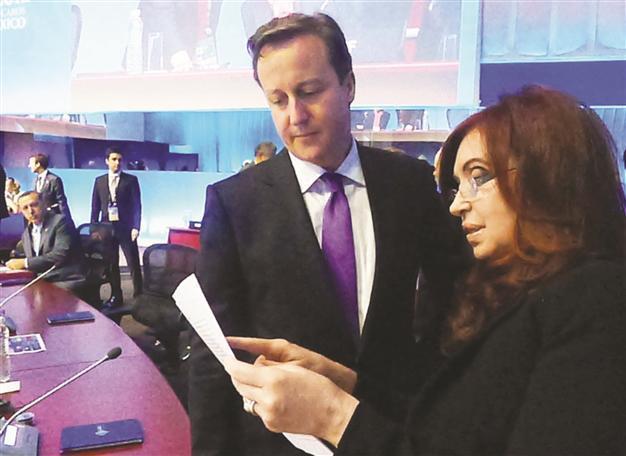Cameron and Kirchner in clash over Falklands
LOS CABOS, Mexico

Argentinian President Kirchner (R) and British PM Cameron are seen during a conversation in Los Cabos. Cameron urges Kirchner to respect Falklands’ residents. AFP photo
Argentina’s President Cristina Kirchner and Britain’s Prime Minister David Cameron clashed publicly at the G-20 summit on June 19 over the future of the disputed Falkland Islands.Argentinian officials branded the British leader a “colonialist” in dismissing Kirchner’s call for talks on the sovereignty of the islands, while Cameron said he had been attempting to counter Argentina’s “propaganda.”
The pair came face-to-face at the meeting of the world’s major economies in Mexico, at a time when tensions between their countries were already running high just days after the 30th anniversary of the Falklands War. Cameron urged Kirchner to respect the will of the 3,000 residents on the South Atlantic islands, who want to remain British, according to Agence France-Presse.
Cameron turned his back
Kirchner countered him by citing U.N. resolutions calling for sovereignty negotiations. “The president had the U.N. resolutions and she said to Cameron: ‘Let’s respect the United Nations’,” Argentina’s Foreign Minister Hector Timmerman said. “The prime minister refused to accept the documents, turned his back and walked away without a farewell,” he added, accusing Britain of disrespecting U.N. resolutions and of retaining an imperialist mindset. “After years of acting as a colonial power they have forgotten that they are responsible for the existence of colonialism, and that it is countries like Argentina that defeated most of the colonial projects in the world,” he said.
Britain recaptured the territory after a brief but fierce war which left 255 British soldiers and 650 Argentines dead. Argentina now has an elected civilian government and Kirchner has called for negotiations with Britain on the islands’ future.
















